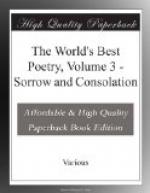The king blew a blast on his bugle horn;
(Silence!)
No answer came; but faint and forlorn
An echo returned on the cold gray morn,
Like the breath of a spirit sighing.
The castle portal stood grimly wide;
None welcomed the king from that weary ride;
For dead, in the light of the dawning day,
The pale sweet form of the welcomer lay,
Who had yearned for his voice while dying!
The panting steed, with a drooping crest,
Stood weary.
The king returned from her chamber of rest,
The thick sobs choking in his breast;
And, that dumb companion eyeing,
The tears gushed forth which he strove to check;
He bowed his head on his charger’s neck:
“O steed, that every nerve didst strain,
Dear steed, our ride hath been in vain
To the halls where my love lay dying!”
CAROLINE E.S. NORTON.
GRIEF.
FROM “HAMLET,” ACT I. SC. 2.
QUEEN.—Good Hamlet, cast thy nighted
color off,
And let thine eye look like a friend on Denmark.
Do not, forever, with thy veiled lids
Seek for thy noble father in the dust:
Thou know’st ’tis common,—all
that live must die,
Passing through nature to eternity.
HAMLET.—Ay, madam, it is common.
QUEEN.—If it be,
Why seems it so particular with thee?
HAMLET.—Seems, madam! nay, it is; I know
not seems.
’Tis not alone my inky cloak, good mother,
Nor customary suits of solemn black,
Nor windy suspiration of forced breath,
No, nor the fruitful river in the eye,
Nor the dejected havior of the visage,
Together with all forms, modes, shows of grief,
That can denote me truly: these, indeed, seem,
For they are actions that a man might play:
But I have that within, which passeth show;
These, but the trappings and the suits of woe.
SHAKESPEARE.
SELECTIONS FROM “IN MEMORIAM.”
[ARTHUR HENRY HALLAM, OB. 1833.]
GRIEF UNSPEAKABLE.
V.
I sometimes hold it half a sin
To put in words the grief I feel:
For words, like Nature, half reveal
And half conceal the Soul within.
But, for the unquiet heart and brain,
A use in measured language lies;
The sad mechanic exercise,
Like dull narcotics, numbing pain.
In words, like weeds, I’ll wrap me o’er,
Like coarsest clothes against the cold;
But that large grief which these enfold
Is given in outline and no more.
DEAD, IN A FOREIGN LAND.
IX.
Fair ship, that from the Italian shore
Sailest the placid ocean-plains
With my lost Arthur’s loved remains,
Spread thy full wings, and waft him o’er.




